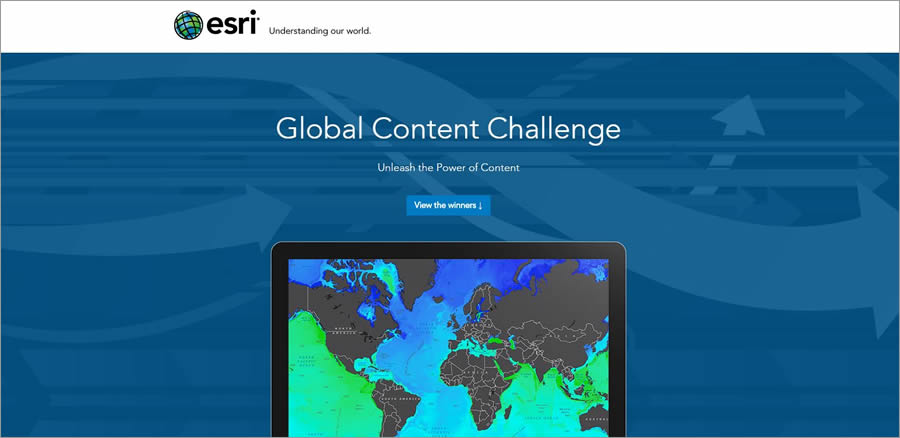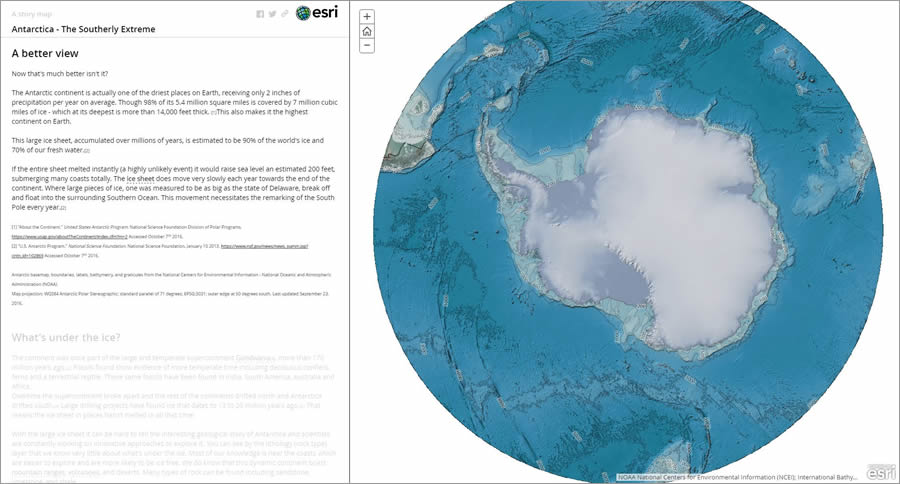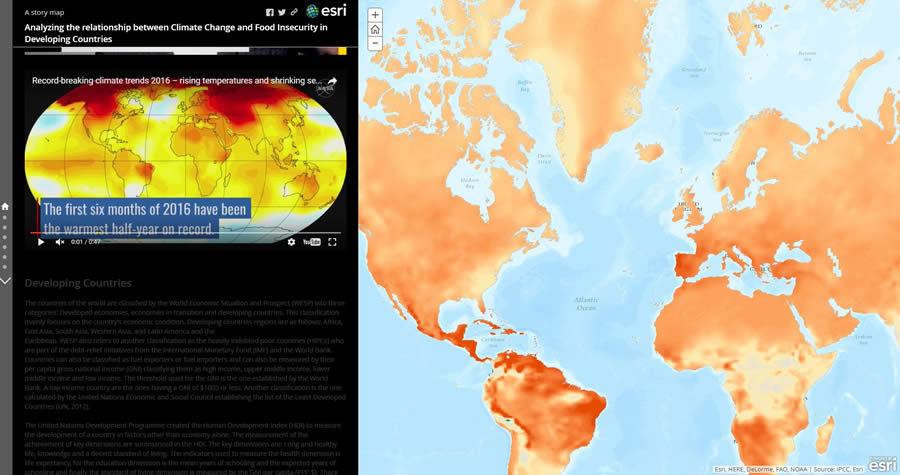Thirteen students used their scientific know-how about our planet, along with their skills working with GIS technology and ArcGIS content, to win prizes in the Esri Global Content Challenge.
The winners were recently announced by Esri chief scientist Dawn J. Wright, who commended them for “unleashing the power of Esri’s Living Atlas of the World content” to create thought-provoking stories related to climate change, tiger conservation, agriculture, food insecurity, urban growth, and other topics.
For example, Alicea Zelesny, a master’s degree student at the University of Wisconsin, Madison, won first place in the ocean category of the competition with her story map, Antarctica—The Southerly Extreme.

The story map explores the continent’s extreme weather, its flora and fauna, the past expeditions to Antarctica, and the scientific research that goes on there today.
“I find Antarctica a fascinating place full of wonder and extremes,” Zelesny said. “I hope this map will bring the same fascination to others. Additionally, with the recently signed agreement protecting a large area of the Ross Sea [as a marine sanctuary], understanding this continent is proving to be important as an international issue.”
Wright said that the Global Content Challenge made students aware of content available from the Living Atlas of the World such as terrain, ocean, climate and weather, and population data. And she praised their imaginative thinking.
“We really appreciate the efforts and creativity of the contestants,” said Wright. “At some schools, the contest was used as part of term projects within GIS courses, which is exactly what we had hoped for. Already, several students have written to say how challenging—in a good way—and thought-provoking the contest was, even if they didn’t win a prize. They were also appreciative of learning about all the Living Atlas content that they were unaware of previously.”

The first-, second-, and third-place winners took home a total of $51,000 in prize money, while those who received honorable mentions received autographed Esri Press books and posters. Seventy people submitted entries to the contest. The winners were selected by a distinguished international panel of judges well-versed in science, GIS, and cartography.
The students were required to make use of selected content in the Living Atlas of the World, which exposed them to this new universe of resources. The students also were required to submit their work as an Esri Story Map Journal app. The winners, their prizes, the contest categories, and links to their story maps are listed below:

Land Category
First place ($10,000): Sara Lubkin; Northern Virginia Community College; Virginia, USA—What Can Beetles Tell Us about Past Climates?
Second place ($5,000): Karl Chastko; McMaster University; Ontario, Canada—Food, Water and 7 Billion People: Improving Water Efficiency in Agriculture
Third place ($2,000): Kayla Wong; McMaster University; Ontario, Canada—Soil Carbon Sequestration Potential Based on Soil Properties
Honorable Mention (Esri merchandise): Danielle Derrick, Carleton University, Canada—A Race for Survival: The Future of Tiger Conservation
Ocean Category
First place ($10,000): Alicea Zelesny; University of Wisconsin, Madison; USA—Antarctica—The Southerly Extreme
Second place ($5,000): Julia Portmann; Washington College; Maryland, USA—Attack of the Blobs
Third place ($2,000): Kevin Yang; McMaster University; Ontario, Canada—Climate Change in Earth’s Polar Regions
Honorable Mention: (Esri merchandise): Maggi Klug; University of Alabama, Huntsville; USA—Devastating Effects of Climate Change on Coastal Florida
Population Category
First place ($10,000): Claudia Caceres; Claremont Graduate University; California, USA—Analyzing the Relationship between Climate Change and Food Insecurity in Developing Countries
Second place ($5,000): Michael Kirchin; McMaster University; Ontario, Canada—The American People
Third place ($2,000): Spencer Elford; McMaster University; Ontario, Canada—Concrete Jungle: Urban Expansion and the Rise of the Megacity
Honorable Mention (Esri merchandise): Kathryn Kulbicki; George Mason University; Virginia, USA—Child Welfare in the News
Honorable Mention (Esri merchandise): Christopher Koido-Bunt; McMaster University; Ontario, Canada—Volcanic Hazard Risk in East and Southeast Asia

